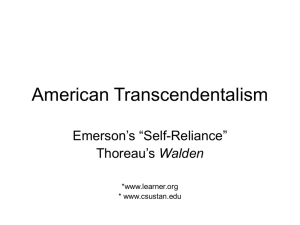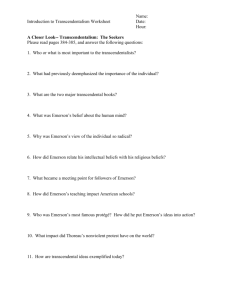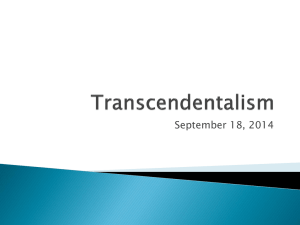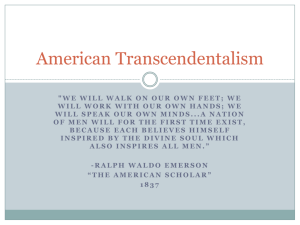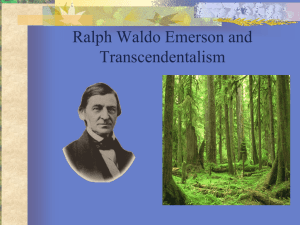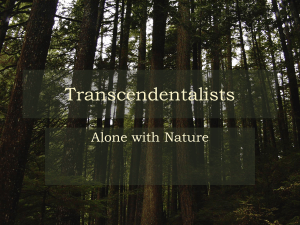Mandy Lehman Becky Boesch Human/Nature FRINQ 21 February
advertisement
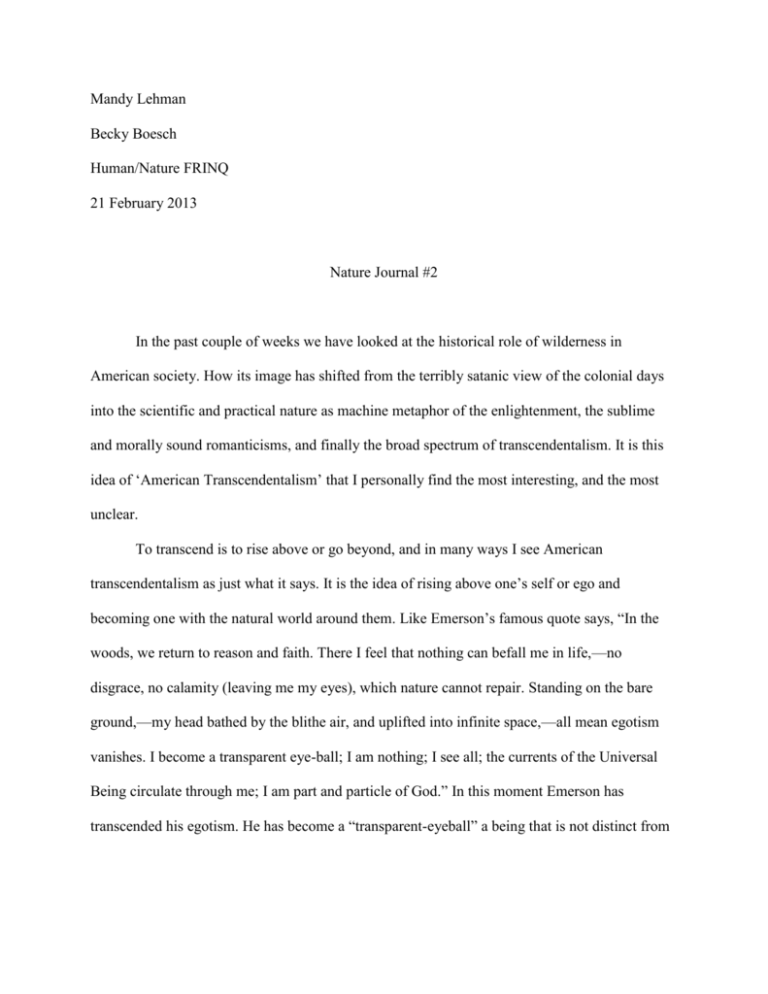
Mandy Lehman Becky Boesch Human/Nature FRINQ 21 February 2013 Nature Journal #2 In the past couple of weeks we have looked at the historical role of wilderness in American society. How its image has shifted from the terribly satanic view of the colonial days into the scientific and practical nature as machine metaphor of the enlightenment, the sublime and morally sound romanticisms, and finally the broad spectrum of transcendentalism. It is this idea of ‘American Transcendentalism’ that I personally find the most interesting, and the most unclear. To transcend is to rise above or go beyond, and in many ways I see American transcendentalism as just what it says. It is the idea of rising above one’s self or ego and becoming one with the natural world around them. Like Emerson’s famous quote says, “In the woods, we return to reason and faith. There I feel that nothing can befall me in life,—no disgrace, no calamity (leaving me my eyes), which nature cannot repair. Standing on the bare ground,—my head bathed by the blithe air, and uplifted into infinite space,—all mean egotism vanishes. I become a transparent eye-ball; I am nothing; I see all; the currents of the Universal Being circulate through me; I am part and particle of God.” In this moment Emerson has transcended his egotism. He has become a “transparent-eyeball” a being that is not distinct from that which is around him. A being that sees all and sees nothing but is complete, because once you have reached that level of transcendence you no longer see or hear, you are. This is fascinating to me. It’s amazing how vividly and effectively Emerson can describe the levels and extents of experiencing nature, and really makes you want to experience the same or similar experiences. As far as the funnel goes (commodity to delight to moral/emotional connection to complete transcendence/understanding) I believe that I have experienced nature as far as Delight, but morality and understanding are a stretch. I also believe that it is nature and really only solitary nature, in which we can be allowed to achieve these levels of transcendence. As is quoted in “the Romantic Wilderness” reading, “My spirit walked not with the souls of men…my griefs, my passions, and my powers, made me a stranger…my joy was in the wilderness.” This being a quote from the Romantic period’s Lord Byron shows just how much the romantic period influenced that of American Transcendentalism. The idea that wilderness is a moral and pure place that can be used to escape the immorality of humanity is a distinctly ‘romantic’ notion, but it can be identified in the transcendent movement as well, showing that these movements are not completely independent of each other. There is represented a similar idea of being closer to nature and allowing yourself to be lost in the fullness of the world apart from humanity. But, this brings up a conflicting point for me. Is it possible to exist apart from cultural influence? Is it possible for any person, even Emerson, to completely shed the lenses and moldings of his past to view the world completely blank and uncorrupted by bias? And, even if it were possible how many members of humanity could actually successfully transcend to that point. Anyone can recognize nature for its abundant riches and beauty, but how many, if any, could truly reach the level of understanding that Emerson outlines. Essentially what I’m asking is can someone truly transcend them self? I don’t know. And, although Emerson seems to believe you can, I have my doubts. If we are, as we have been studying, products of our culture and view everything through anthropocentric lenses, then following that logic we could never truly separate our ‘self’ from those lenses. This is because, without those lenses there is no self. Since self is defined by lenses, removing the lenses in turn would remove self. For a fire to ‘live’ it needs three things, fuel, heat, and oxygen. If you eliminate any one of these items, it will perish. So, just like the fire is defined by these lifelines, self is similarly defined by lenses. Every person will view wilderness in different lights according to their personal lenses making the definition and true understanding of nature undefinable and impossible to generalize.
